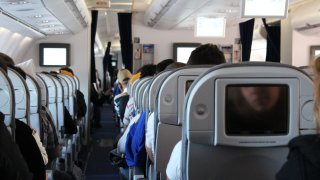
The Federal Aviation Administration is considering updates to emergency kits that would require airlines to carry on board EpiPens, pediatric doses of antihistamines and medicine to reverse opioid overdoses.
Commercial airlines are required to carry a basic set of medical tools, including aspirin, a stethoscope and devices used to help with cardiopulmonary resuscitation, or CPR. The FAA, however, does not require EpiPens, or epinephrine auto-injectors, on commercial flights, a lapse that frustrates allergists.
The Aerospace Medical Association recently advised the FAA that airlines should routinely carry epinephrine auto-injectors and other allergy medicines in doses for both adults and children. The agency is also considering updating the kits to include automated blood pressure cuffs and Narcan, which reverses the effects of opioid overdoses.
"The FAA is reviewing the emergency medical kit requirements," the agency said in a statement to NBC News.
Feeling out of the loop? We'll catch you up on the Chicago news you need to know. Sign up for the weekly Chicago Catch-Up newsletter here.
Travelers, even those who have never had allergies before, can avoid risk during flights by wiping down seats, armrests and tray tables upon boarding, Jenna Riemenschneider, senior director of advocacy and policy at the Asthma and Allergy Foundation of America, said.
Read the full story on NBCNews.com here.

